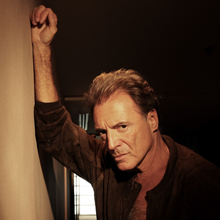Armand Assante Interview On 'The Line,' The Future Of Latino Film
Armand Assante was recently honored by the New York Latino Film Festival, he's giving his take on his latest role in James Cotton’s new film The Line. “The Line is historically and in the present a title that was given for the drug trade between Mexico and the United States, ‘La Linea,’ ” Assante told Uinterview exclusively. The Line is the featured film in the Maya Inaugural Indie Film Series sponsored by Blockbuster, which is expanding to select cities in the coming weeks.
A New Yorker by birth, Assante’s career first began as a cast member in two NBC soap operas. His first film was Lords of Flatbush (1974), but he gained the most attention for the hit Private Benjamin (1980), as the charming French doctor Henri Tremont.
Assante has been a strong advocate for Latino film in Hollywood. “Politically, it’s extremely important that Latin America is heard about,” he told Uinterview. “The population of Spanish speaking people is enormous, and there is no doubt that their time has come.”
(Photo: Maya Entertrainment)
(Photo: Maya Entertainment)
1 Comments
Leave a comment
Well, first of all, I think the film is fortunate to be a part of it. I’ve been involved in a number of film festivals and I can’t stress enough the importance and the cultural significance and relevance of film festivals now globally because they are one of the few places that political voices around the world can be heard. At most of the serious film festivals you’re dealing with people who are basically completely unobserved. I was on a jury at the Kiev International Film Festival in the Ukraine six months ago and the talent and the filmmakers coming from places where we wouldn’t even imagine films are being made was astonishing. The most astonishing thing was that in every film there was a political relevance and an issue that by any standard if a Hollywood film had been present at that festival, it would have been paled. It’s an extraordinarily important platform for voices socially and economically worldwide right now, as well as human rights. One of the best festivals I’ve been to is the one at Lincoln Center, which is The International Human Rights Film Festival that’s held every year. It’s amazing what’s coming out across the world from people who really do not have any kind of funding to do these films. The sad truth is that most of these films will never be distributed, will never see the light of day, and will never get into a theater.
The Line is historically and in the present a title that was given for the drug trade between Mexico and the U.S. “La Linea” was a tunnel, and there have been several tunnels discovered, that went from the Mexican border to the U.S. border, and those “lines,” if you will, were used for the heroin trade predominantly, as well as cocaine, and everything that they bring into the U.S. The problem is, and this is what’s discussed in the film, is that the line is in severe danger now of being compromised by terrorism. The character [Pelon] played by Esai Morales is a disenfranchised, very dangerous criminal who would compromise everything for his own ends. The rest of the characters are really operatives trying to entrap him.
The character that I play is really an operative, and he is using the guise of a priest the monitor the activities of Pelon. It’s very true from the research that I’ve done that even gangsters of that magnitude had father confessors and priests that they entrusted their conscience to.
No, we might do another one, but this is the first for me.
I will tell you that I believe because he is the son of a U.S. Army General, I think he is very well informed on the type of characters depicted in the film. I’ve seen the film now once and what I took away from it looking at it as an actor and a person wondering, ‘What if I produced it, what would I have done?’ was that there was an emotional landscape that these characters live in that I think was very real. It was not romanticized, and this is not a James Bond thriller by any stretch of the imagination. It’s more a depiction of the kind of isolation and emotional desolation that these men live in and the trade off the make in terms of risk to their life and the life of everyone around them is very disturbing. It’s not unlike the men who are now in Afghanistan. These are horrifying missions, so what I appreciate what R. Ellis Frazier was writing about and what he managed to get on screen was a certain landscape to these characters that I’ve never seen. I’ve always seen it very romanticized, very glib, very super macho, ‘We know what we’re doing.’ And in this instance it was the disorientation of living a violent life and how its not.. [pause].. well to sum it up, this is not a Hollywoodized version of that particular type of story.
We’re discussing it because I really like his writing and he really appreciates me as a worker. So we’re talking now about doing another project in the very near future.
Well, I mean, it’s been coming for a very long time. Certainly, politically, it’s extremely important that Latin America is heard about. I’m sure at this festival right now you’ve got films from Cuba, Chile, Argentina, Venezuela, Mexico, so I just think that it’s extremely relevant that their social and political voices are heard. This is a huge part of the world, and you have to remember that even as of fifteen years ago The United States was predicted to be 80% Spanish speaking. The population of Spanish speaking people in the US is enormous and there is no question that their time has come and well it should, especially when you consider the political turmoil of the 70s going back all the way to the beginning of the twentieth century. That’s what these people in South America have lived through. So it is super, super important that they become part of the marketplace. I can’t think of anything more relevant in terms of the film world. It’s as relevant as what I’ve noticed as festivals around the world is that the voices now are finally starting to come out of the Middle East; of Iran, Afghanistan, Kurdistan, Kazakhstan, Uzbekistan, and these are serious filmmakers and who would have thought? Their time is coming, it’s inevitable, and at that film festival in Kiev I was voting on a film that I had tremendous appreciation for by a young woman named Hannah Makhmalbaf and she is Iranian-Afghan, and it’s called Buddha Collapsed Out of Shame. It’s about children, she made it with three-year-old children, can you imagine? Three-year-old children acting on the screen and you thought you were watching a documentary. She made a film about how the children in Afghanistan are manipulated by the Taliban emotionally, physically and mentally. A catastrophic film, and it just rocks when you see it you think that these kids are acting. She [Ms. Makhmalbaf] is the daughter of a filmmaking family in Iran. When you see the level of that kind of work, and also the relevance of that particular film, which by the way I didn’t see it at The Oscars, I didn’t see it on any distribution lists, and when you watch the film you think ‘My God, we think we have problems?” [laughs] I’m not saying every film I saw was a work of genius, but that was one of maybe 30 from 63 films that had social relevance to the world that was staggering. Any Hollywood film that showed up at a festival like that, let me tell you, would just feel like leaving. They don’t even have a presence because the social relevance of these subjects just shatters you.
I’ve always thought Stallone was one of the most unique people in the industry I’ve ever worked with and an incredibly talented man. He’s very, very driven, and he knows his market. He knew at a very young age that he could make a huge impact with the stories that he had. He has the gifts; an immensely gifted athlete, a very bright individual, and extremely hardworking. I mean, just look at the body of work that he’s created. You can’t categorize Sly, he’s a very unique entity to himself. If anything, the way people have categorized him as Rocky and Rambo doesn’t speak to the other immense gifts that he has as a director, as a writer, as an athlete, as a spokesperson. He’s been responsible for many, many careers already in Hollywood. He has given voice to millions of people. He is, in my estimations, a very, very underestimated person in this industry. So I’m not only grateful to him, but, and I say this sincerely, I have the deepest admiration and respect for him both as a person and an artist ever since I’ve known him. I don’t think anyone should underestimate what he still is capable of doing.
Well what I’m trying to do with my life now is produce, and I want to produce for a number of reasons. One, I think I have decent stories to put out there, but also I would like to create environments for young people that I had when I was young. I feel that the creative process is being terribly eroded by the very fact that children and young people in the industry and tremendously over-informationalized. They don’t understand that the core for someone like myself who has had the very good fortune to have a career in this industry. The core of it is the basis of what storytelling is and learning and understanding the process by which you tell stories. The reason I use the word ‘process’ is that the creative process is completely eroded today by the speed at which this industry is dictated in terms of economics and the damage this does to the journey that young people should be on. And that’s a phenomenal experience to have not only as any individual. I remember when I was at the American Academy of Dramatic Arts, I was in a class there with psychologists, doctors, lawyers, people from all over the world who basically wanted to step into the arena to define themselves. I have never, ever devalued the importance of theater; I think it’s the most important medium we have for people to begin to understand what it is to be in the arena, and on many, many levels to be put to the test in the arena. Why would a doctor go to an acting school? Because he wants to define himself and learn to express himself, even if it only comes down to public speaking. The importance of theater is opening people up to being transparent. It’s a voyage of transparency. That’s the most important contribution you can make to any individual in society. That’s why theater was so important in the time of the Greeks. I can’t stress enough how the young performers today are, I feel, being chewed up and spat out by this industry. Why? Because they haven’t been given the creative groundwork and understanding that [someone like myself] spent 20 years of hard, hard work in the American theater before I made a film. The fundamentals of the creative process are eroded today by the speed that is demanded of people to perform. It’s very dangerous, and by having ten flat screen televisions in every restaurant we walk into now we believe that this is an easy thing to do. The young person does not understand that the young person up on that screen went through a long creative process in order to do it. There are more and more people in their twenties, thirties, and forties trying to manipulate themselves into this industry, and they still don’t get it.
That’s an adage that’s certainly been proven [laughs]. Who was it Andy Warhol [who said ‘everybody will be famous for 15 minutes’]? He didn’t know that was proven exponentially [laughs]. But he was absolutely right.
Yeah, absolutely at this point in my life I want to direct and produce. I’ve also spearheaded a lot of stories and I did a lot of ghostwriting on projects that I’ve worked on that people don’t really know about. In my own experience, I know the departments and the obligations to those departments that you when you take on a job like [directing or producing], and I certainly wouldn’t be intimidated by it at all. The only thing I am intimidated by is that I don’t want to do a project that I am not passionate about as it’s akin to having ten marriages, except that you have a camera. You’re obligated to a lot of different departments and a lot of different people and you’re getting a lot of information constantly even within the course of one day that can be quite disconcerting if you are not absolutely focused on what you want to express.
I have four films that I have been developing these past three or four years that are still moving very slowly, especially now in light of the economy. I have two more in the offing that are really intelligent scripts, but I’m afraid to talk about them because, honestly, in this economy there are so many plugs pulled in the last two years that I’m loathed to say what I’m doing [laughs] because I may not be doing it.
RELATED ARTICLES
Get the most-revealing celebrity conversations with the uInterview podcast!








Interesting guy. He seems very thoughtful. I never knew this side of him.